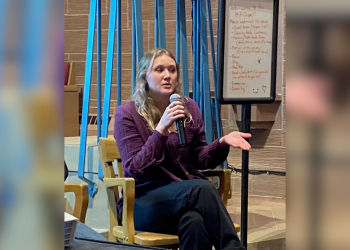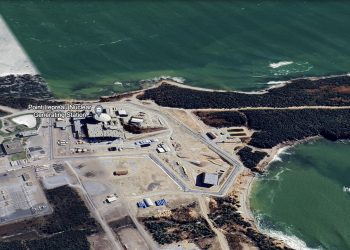The company Moltex Energy wants to extract plutonium from the thousands of used nuclear fuel bundles stored at Point Lepreau on the Bay of Fundy. They plan to use the plutonium as fuel for a new nuclear reactor, still in the design stage. If the project is successful, the entire package could be replicated and sold to other countries.
However, American scientists and non-proliferation experts say that Canadian government support for the Moltex plutonium-extraction project is undermining the global nuclear weapons non-proliferation regime. Plutonium is the primary nuclear explosive material in the world’s arsenals of nuclear weapons.
On March 18 this year, federal Intergovernmental Affairs Minister Dominic LeBlanc announced a $50.5 million grant for the Moltex project, adding to the $5 million the New Brunswick government gave the company in 2018. During the announcement, LeBlanc and Premier Blaine Higgs described the Moltex project as “recycling” nuclear waste, although less than one percent of the used nuclear fuel is potentially available for use as new reactor fuel, leaving a lot of radioactive waste leftovers.
On May 25, nine US non-proliferation experts sent an open letter to Prime Minister Trudeau expressing concern that by “backing spent-fuel reprocessing and plutonium extraction, the government of Canada will undermine the global nuclear weapons non-proliferation regime that Canada has done so much to strengthen.”
The nine signatories to the letter include senior White House scientist appointees and other US government advisors who worked under six US presidents: Kennedy, Johnson, Nixon, George H.W. Bush, Clinton, and Obama; and who hold professorships at the Harvard Kennedy School, University of Maryland, Georgetown University, University of Texas at Austin, George Washington University and Princeton University.
Plutonium is a human-made element created as a byproduct in every nuclear reactor. India exploded its first nuclear weapon in 1974 using plutonium extracted from a “peaceful” Canadian nuclear reactor given as a gift many years earlier. In the months afterwards, it was discovered that South Korea, Pakistan, Taiwan and Argentina – all customers of Canadian nuclear technology – were well on the way to replicating India’s achievement.
The US and its allies acted swiftly to prevent these countries from acquiring the necessary plutonium extraction facilities. To this day South Korea is not allowed to extract plutonium from used nuclear fuel on its own territory due to proliferation concerns.
Several years after the Indian explosion, the US Carter administration ended federal support for civil reprocessing of spent nuclear fuel in the US out of concern that making plutonium more available would contribute to the proliferation of nuclear weapons. At that time, Canada’s policy on reprocessing also changed to accord with the US policy.
Moltex is proposing extract plutonium at Point Lepreau using “pyroprocessing,” in which the solid used reactor fuel is converted to a liquid form, dissolved in a very hot bath of molten salt. What happens next was described by Moltex Chairman and Chief Scientist Ian Scott in a recent article in Energy Intelligence. “We then — in a very, very simple process — extract the plutonium selectively from that molten metal. It’s literally a pot. You put the metal in, put salt in the top, mix them up, and the plutonium moves into the salt, and the salt’s our fuel. That’s it … You tip the crucible and out pours the fuel for our reactor.”
From an international perspective, the federal support of the Moltex project can be seen as Canada sending a signal – giving a green light to plutonium extraction and the reprocessing of used nuclear fuel.
The US experts are concerned other countries could point to Canada’s support of the Moltex project to help justify their own plutonium acquisition programs. That could undo years of efforts to keep nuclear weapons out of the hands of countries that might want to join the ranks of unofficial nuclear weapons states. The Moltex project is especially irksome since its proposed pyroprocessing technology is very similar to the one South Korea has been trying to deploy for almost 10 years.
Despite the alarm raised by the nine experts in their letter to Trudeau, the government has not yet responded. The only response has come from the industry, Moltex CEO Rory O’Sullivan. His reply to a Globe and Mail reporter: the plutonium extracted in the Moltex facility would be “completely unsuitable for use in weapons.”
But the International Atomic Energy Agency (IAEA) has stated that “Nuclear weapons can be fabricated using plutonium containing virtually any combination of plutonium isotopes.” All plutonium is of equal “sensitivity” for purposes of IAEA safeguards in non-nuclear weapon States.
Similarly, a 2009 report by non-proliferation experts from six US national laboratories concluded that pyroprocessing is about as susceptible to misuse for nuclear weapons as the original reprocessing technology used by the military.
In 2011, a US State Department official responsible stated that pyroprocessing is just as dangerous from a proliferation point of view as any other kind of plutonium extraction technology, saying “frankly and positively that pyroprocessing is reprocessing. Period. Full stop.”
And, despite years of effort, the IAEA has not yet developed an approach to effectively safeguard pyroprocessing to prevent diversion of plutonium for illicit uses.
Given that history has shown the dangers of promoting the greater availability of plutonium, why is the federal government supporting pyroprocessing?
The answer: the Canadian nuclear lobby wants it. In the nuclear industry’s report released in March, “Feasibility of Small Modular Reactor Development and Deployment in Canada,” reprocessing (which they call “recycling”) spent nuclear fuel is presented as key to the industry’s future plans.
To date however, there has been no democratic open debate or public consultation over the path Canada is charting with nuclear energy. Important national and international issues are at stake, and conscientious New Brunswickers and all Canadians should sit up and take notice. Political representatives in the Canadian Parliament and the New Brunswick Legislature owe it to their constituents to demand more accountability and ask why our governments are supporting a plutonium-extraction project that raises such serious international concerns.
An earlier version of this commentary was published in The Hill Times.
Susan O’Donnell, a Fredericton-based researcher specializing in technology adoption and environmental issues, is the lead researcher for the RAVEN project at the University of New Brunswick. Gordon Edwards is a Montreal-based mathematician, physicist, nuclear consultant, and President of the Canadian Coalition for Nuclear Responsibility.



![Radioactivity and nuclear waste under scrutiny in Peskotomuhkati homeland [video]](https://nbmediacoop.org/wp-content/uploads/2025/10/EdwardsAkagiOct52025-1-350x250.jpg)




![‘Continuum of genocide’: Pentagon funding of Sisson mine provokes renewed opposition from Wolastoq Elders [video]](https://nbmediacoop.org/wp-content/uploads/2025/07/SissonMine-2-120x86.jpg)
![NDP leadership hopeful submits official bid, challenging ‘undemocratic’ vetting process [video]](https://nbmediacoop.org/wp-content/uploads/2025/11/EnglerNov72025-120x86.jpg)
